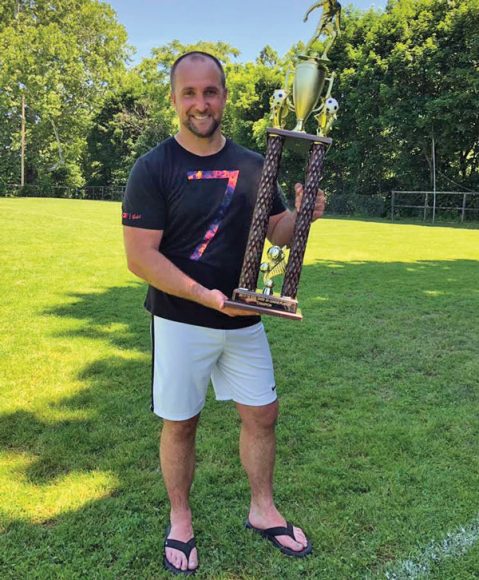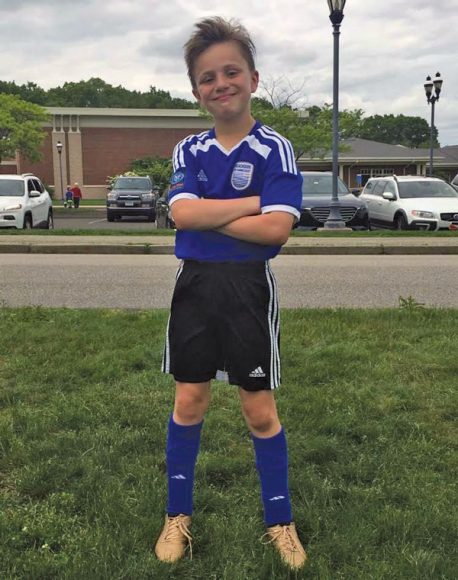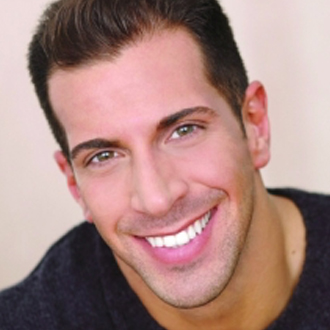Matt Osborne has been a colleague and friend of mine for many years. He is a 12-year veteran of the health and fitness industry and currently runs Three Lions Health and Fitness, a private personal training practice in New Canaan. He holds bachelor and master’s degrees in exercise science and is also nationally certified as an athletic trainer, strength and conditioning specialist and personal trainer. He is a former Division 1 soccer player with George Washington University, where he was recently inducted into its Athletic Hall of Fame, and a former professional player in the USL Pro-Select League. Matt’s son, Spencer, is an academy soccer player with Beachside of Connecticut and has also represented Next Gen USA at the Iber Cup in Denmark.
As a high-level athlete, full-time fitness coach and father of three, I could think of no one better to tackle the subject of youth sports today.
What advice would you give to parents who want their children to excel athletically?
“I think the more important question to answer here is what does excelling athletically actually mean to you? If excelling athletically means being the next LeBron James or the next Cristiano Ronaldo, I think a lot of parents will ultimately be destined for disappointment. Realistically, the likelihood of your child being an athlete of this caliber is probably similar to winning the lottery.
“As a parent, I think it’s more important to create an environment for your children where athletic excellence revolves more around having a healthy relationship with sport and exercise, where your kids participate, develop and have fun in a pressure- and judgment-free atmosphere. In my experience, elite athletes are born not made and, in this type of environment, they’ll naturally gravitate, based on their own successes and failures, toward the sport that’s the best expression of their ability.”
What are some of the biggest mistakes you think are being made in youth sports today?
“Not just in youth sports, but in a lot of life’s endeavors, I think people fall prey to a ‘more-is-more’ mentality, where they believe the more they do, the better they’ll become. In my opinion, this belief has trickled down to youth sports, manifesting as more practices, more games and more strength and conditioning sessions, all of which lead to more overall volume. Volume is the product of frequency, intensity and duration and, if it’s not managed appropriately, it can ultimately lead to over-training and injury.
“The rise in adolescent sports-related injury is extremely concerning and in my opinion goes hand in hand with the ‘more-is-more’ mentality with children being exposed to training frequencies, intensities and duration that they’re not physically and/or mentally prepared for. In my opinion, club teams and school teams should be adopting a ‘quality-over-quantity’ approach to their training methods in order to decrease over-training and reduce injury prevalence.”
What is your take on sports specialization and year-round sport training?
“At a young age, sports specialization and year-round sport training play into the aforementioned ‘more-is-more’ mentality. My son, Spencer, is an advanced soccer player and could easily play four to five times per week throughout the year, but I ensure he takes several months off from the sport in the summer, as well as plenty of smaller breaks throughout the year in order to minimize burnout and prevent injury. In the summer he attends a sleep-away camp that offers a broad range of sports and activities to develop the facets of his athletic ability that soccer otherwise neglects.
“At young ages, it is highly beneficial for a child’s all-round physical and kinesiological development to participate in a variety of sports. Different sports develop different skills and movement competencies, which in the long term will create a more well-rounded athlete.
“Obviously there comes a point in a child’s sports career where if they have the ability to pursue a sport at the collegiate or professional level, specialization is the next logical step. However, it is my opinion that exposing children to a wide variety of athletic stimuli at younger ages builds a stronger foundation for an older specialized athlete.”
How have you as a parent been able to manage your own health while helping raise three children and working a job?
“I must admit, the logistics of having three children and a job could potentially make it very easy to neglect my own personal health and wellness, and I’ve found that the key to everything is scheduling and preparation. In terms of scheduling, this is extremely important when it comes to making time for my own workouts. At the beginning of the week, I look ahead at my upcoming schedule to see where my windows of opportunity are for exercise. Once I’ve scheduled my workout sessions, I will not take on additional responsibilities that could hinder my chances of following through.
“From a nutritional standpoint, preparation is the key to success, with the main focus being to make sure my fridges and freezers are stocked with all the necessary items to facilitate quick and healthy meal preparation. Finally, getting an adequate amount of sleep is a key component of my health routine. Ensuring I get seven to nine hours of sleep per night is a critical component of my recovery and rejuvenation strategy.”
Reach Giovanni on Twitter @GiovanniRoselli and at his website, GiovanniRoselli.com.



